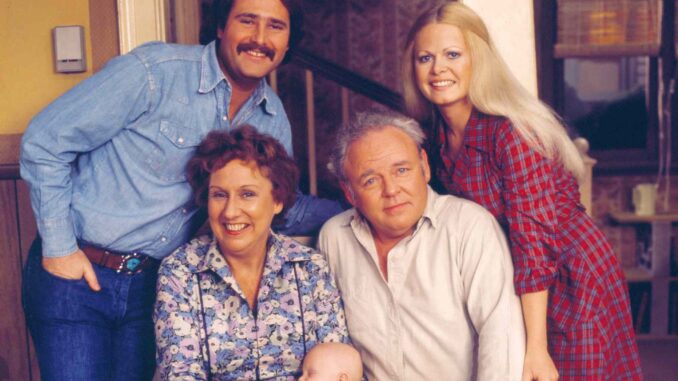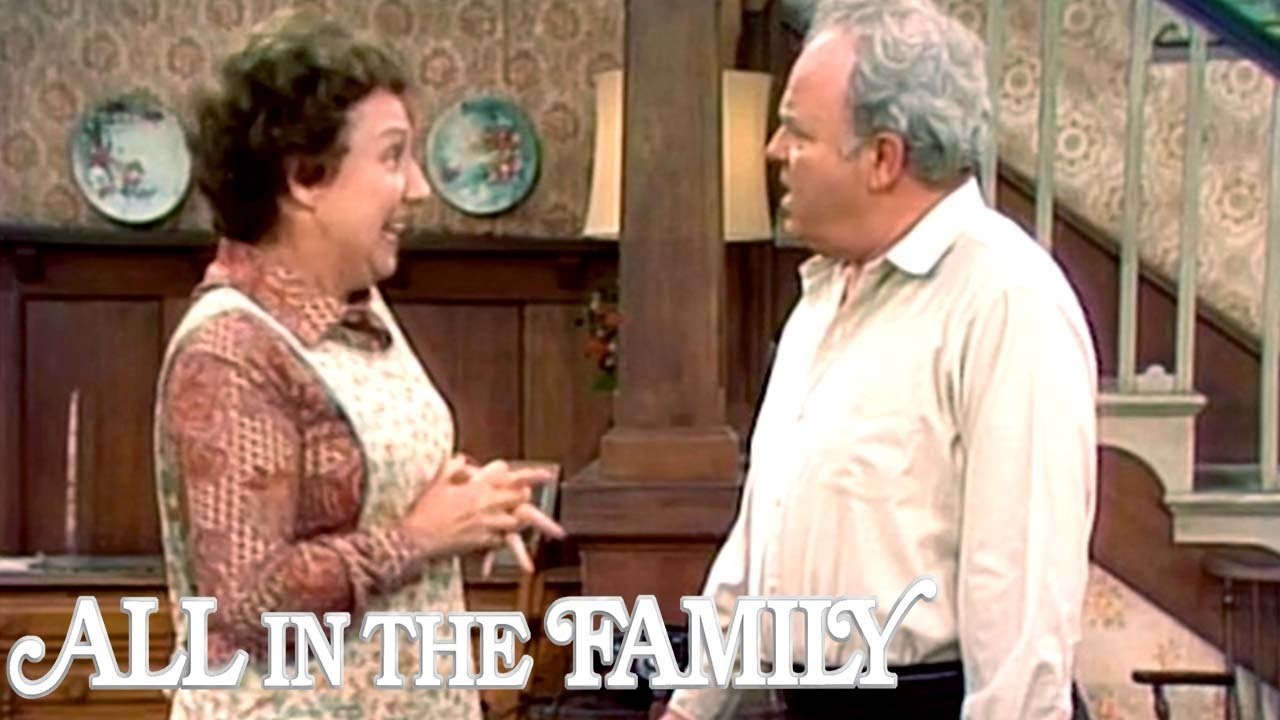
 The “All in the Family” episode “Archie’s Brief Encounter” initially aired as a one-hour special, as it dealt with some pretty heavy subject matter. Notably, it was the episode wherein it looked like Edith Bunker (Jean Stapleton) was going to leave her husband Archie (Carroll O’Connor) once and for all. Archie loves Edith, of course, but he has a selfish streak a mile wide, along with many, many other character flaws that require a lot of patience to withstand (although O’Connor himself was a stalwart union man). After its first airing, “Brief Encounter” was presented in two parts.
The “All in the Family” episode “Archie’s Brief Encounter” initially aired as a one-hour special, as it dealt with some pretty heavy subject matter. Notably, it was the episode wherein it looked like Edith Bunker (Jean Stapleton) was going to leave her husband Archie (Carroll O’Connor) once and for all. Archie loves Edith, of course, but he has a selfish streak a mile wide, along with many, many other character flaws that require a lot of patience to withstand (although O’Connor himself was a stalwart union man). After its first airing, “Brief Encounter” was presented in two parts.
In the episode, Archie is feeling neglected by Edith, as she is putting in a lot of hours at Sunshine Home, the retirement home where she works. Then, one evening, Archie receives romantic attention from a waitress named Denise (Janis Paige). When Edith catches Archie flirting with Denise, she is incensed and heartbroken. Other details about Archie’s whereabouts eventually lead her to believe that he is having an affair. In one heart-wrenching scene, Edith, unable to speak a word, packs her bag and goes to live at Sunshine Home; it’s all become too much to bear. The episode continues apace, with their peers working overtime to save the Bunkers’ marriage. For a moment, though, it did seem that everything was falling apart.
Stapleton, it seems, was the one who conceived of that scene. In a 1981 interview with the San Francisco Examiner, the actor revealed that the original script for “Archie’s Brief Encounter” contained a long, angry, very wordy screed wherein Edith scolded Archie and poured her heart out. Stapleton, who had been playing Edith for six seasons on “All in the Family” by that point, argued that an angry rant was very out of character.
Stapleton felt that Edith wouldn’t yell at Archie
Stapleton noted that “All in the Family” creator Norman Lear was always very open to story and character suggestions from his cast, so she had no issues bringing up Edith’s out-of-character moment to him. When it came to catching Archie with another woman (potentially), Stapleton said that Edith wouldn’t have reacted the way she was initially written. As she put it: “They have a confrontation at home. [Edith] has found out that he went to [the waitress’] apartment. He tries to lie his way out of it. […] She wouldn’t have been able to cope, or release a great flood of words. […] [So, instead, Edith] went to the closet, got her coat on, and very solidly left.”
Edith was often depicted as something of a naif, but she was emotionally honest and definitely had her breaking point. Archie, meanwhile, was such a popular character that he became a new TV archetype: the lovable misanthrope. Poor Edith was constantly stifled by him (with Archie often demanding that she stifle herself). “All in the Family” lasted nine seasons (!), so of course Archie had to soften at some point. Edith remained patient through the whole series, though, and Archie would lose his rudder altogether when Edith died, as revealed in the spinoff series “Archie Bunker’s Place.”
Edith was so good-natured that when she was mad, you knew things were bad. When she wrestled with serious personal issues like faith (as she did in the episode “Edith’s Crisis of Faith”), she was really wrestling. Stapleton’s silent outrage at Archie’s potential infidelity was enough. Stapleton knew what she was doing.
Ever wondered how one actor’s personal choice can change the entire course of a television show? Jean Stapleton, the heart and soul of All In The Family, did exactly that. Her decision altered a crucial scene involving her beloved character, Edith Bunker, and fans never even realized how different things could’ve turned out. Let’s dive deep into this untold story that shaped one of TV’s most unforgettable moments.
The Power of Jean Stapleton: More Than Just Edith Bunker
Jean Stapleton wasn’t just playing a part; she was Edith Bunker. But she also wasn’t afraid to speak up when something didn’t sit right with her. In fact, her instincts helped shift the show in a more thoughtful, authentic direction. What was this pivotal moment? Let’s set the scene.
Setting The Scene: All In The Family’s Big Gamble
When All In The Family aired in the early 1970s, it broke every rule in the book. Racism, sexism, politics—no topic was off-limits. But behind the show’s humor and shocking honesty was a script that almost led Edith Bunker down a dark path… until Jean Stapleton stepped in.
The Original Script: Edith Faces Tragedy
In one key episode, the writers had planned for Edith Bunker to be assaulted—a shocking and deeply uncomfortable storyline for the show’s matriarch. The idea was bold, but Jean Stapleton wasn’t convinced.
Jean Stapleton’s Reaction: Drawing The Line
When Stapleton read the script, she immediately felt it went too far. Edith was the moral compass, the gentle, kind heart of the Bunker family. Such a traumatic event, she argued, would permanently damage the character—possibly beyond repair.
A Heated Debate Behind The Scenes
The producers pushed back. They believed the story was powerful and relevant. But Jean stood her ground. She passionately defended Edith’s integrity, arguing that the trauma would change Edith in ways that didn’t fit the show’s tone—or what the audience loved about her.
Why Edith Bunker Mattered So Much
Why was Edith so special? She wasn’t just Archie’s wife or the “dingbat” of the family. She was the show’s quiet strength, the heart that kept the chaos in check. Without her warmth, All In The Family would’ve lost its soul.
The Writers Compromise: Changing The Outcome
Finally, thanks to Stapleton’s insistence, the scene was rewritten. Instead of showing a brutal attack, the episode implied danger but spared Edith from direct harm. This left her dignity—and the viewers’ connection to her—intact.
The Result: A Powerful Episode Without Crossing The Line
Even without the graphic scene, the episode packed a punch. It addressed real fears that women faced without traumatizing the audience—or shattering Edith’s beloved persona.
Jean Stapleton’s Legacy: Protecting Edith, Protecting Us
Thanks to Stapleton, Edith Bunker remained whole. Her courage not only protected the character but also the millions of fans who saw a bit of themselves—or their mothers—in Edith.
Fans React: Unseen, But Felt
Here’s the crazy part: most fans never knew about this behind-the-scenes battle. Yet they felt it. Edith stayed Edith—lovable, gentle, resilient—because Jean Stapleton stood her ground when it mattered most.
What If Jean Had Stayed Silent?
Imagine a world where Edith had been forever changed by trauma. Would audiences have loved her the same way? Would Archie’s loudmouth ignorance have been tolerable without Edith’s balancing warmth? Probably not.
A Rare Example Of Actor Power In Classic TV
Back in the ’70s, actors rarely questioned scripts, especially women. But Jean Stapleton proved that sometimes, standing up to the writers wasn’t just brave—it was necessary.
Jean Stapleton: A Star Who Knew Her Worth
Stapleton wasn’t just another actress collecting a paycheck. She cared deeply about her role, the story, and the impact on millions of homes watching every week.
How This Moment Changed TV Forever
Because of her, future shows learned an important lesson: don’t sacrifice a character’s essence for shock value. Respecting the heart of a character matters. And audiences can sense when something rings false.
The Takeaway: Why This Story Still Matters Today
In today’s world of gritty reboots and shocking twists, Jean Stapleton’s choice reminds us of a forgotten truth: sometimes restraint makes for better storytelling. Shock isn’t everything. Heart wins.
Conclusion: Edith Bunker Survived Because Jean Stapleton Cared
So the next time you watch All In The Family reruns, remember this hidden chapter. Edith Bunker stayed pure, kind, and strong—not because the writers planned it that way—but because Jean Stapleton wouldn’t let them destroy her. It’s proof that one voice really can change history—even in Hollywood.
